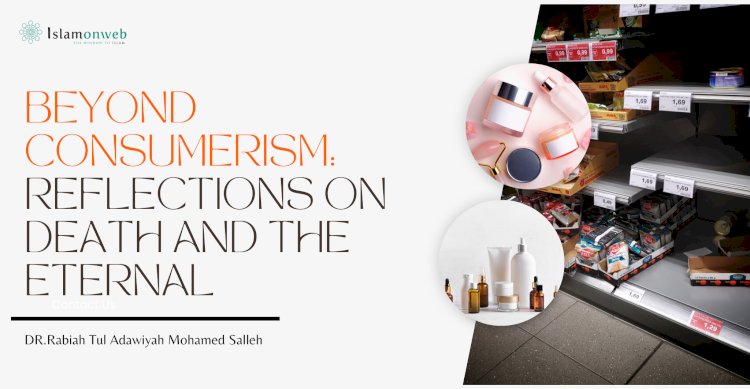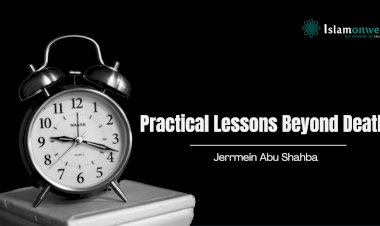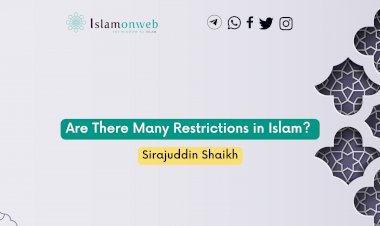Beyond Consumerism: Reflections on Death and the Eternal
Go ahead—open any social media app right now. Chances are, the first thing you’ll encounter is a flood of advertisements urging you to buy something new: a gadget promising to boost productivity, clothes claiming to redefine your style, or makeup marketed as the ultimate must-have. With the rise of online shopping platforms like Shopee, Lazada, and countless others, shopping has never been easier—or more tempting. It’s all just a click away. Free shipping, discounts, and flash sales lure us in daily, making it hard to resist the urge to spend.
Five months ago, I purchased a skincare item. I use it daily, and yet, it’s far from finished. Meanwhile, the same brand has launched several new items in that short span. On social media, I noticed influencers promoting the same product I bought—only to see them endorsing nearly every new item the brand released. It left me wondering: How can one person use so many skincare products without damaging their skin? That’s when I realised the truth—it’s all just part of a deceptive marketing strategy designed to create endless demand and fuel overconsumption.
This constant push for new products made me pause and reflect: How much do we really need? Many of us buy not because we lack something, but because convenience and relentless marketing convince us that we do.
A Personal Reflection on Death and Materialism
Three years ago, I lost my husband to sudden death. It was a moment that shook me to my core. As much pain as it brought, his passing also gave me so much clarity. I was honoured to wash his body—a sacred and humbling act. That experience taught me one invaluable lesson: when we return to Allah, we bring nothing from this world with us. Not even our own bodies, which we consider our closest and most personal possession.
That moment crystallised the reality that everything we accumulate in this world—our wealth, body, possessions, and status—holds no permanence. All that remains is our record of deeds: the charity we gave, the kindness we showed, and the time we spent worshipping Allah.
It reminded me of a verse in the Quran:
“And worship your Lord until the certainty (death) comes to you.”(Al-Hijr: 99)
In this verse, Allah refers to death as certainty. What we can understand from this is that life is not promised to us, but death—the day we return to our Rabb—is certain. Whether we deny it or accept it, this is an inevitable reality. Another verse in the Quran:
“Every soul will taste death. And you will only be given your [full] compensation on the Day of Resurrection.” (Ali Imran:185)
This verse is a clear reminder that this world is temporary, and our true accountability lies in the hereafter. The wealth, possessions, and status we chase in this life will not benefit us in the grave. What truly matters is how we use these blessings to earn Allah’s pleasure and prepare for our eternal home.
The Illusion of Ownership
We often believe we “own” the things we buy, but true ownership is merely an illusion. Everything we claim as ours—our homes, cars, gadgets, and even our clothes—will belong to someone else the moment we die.
On the day we return to Allah, the wealth we accumulated will be transferred to others—whether to family, friends, or even strangers. Our possessions will be redistributed, discarded, or forgotten, and even our bodies will return to the earth. Thus, we are not true owners but temporary custodians, entrusted with these things for the short duration of our lives.
This reality should challenge us to rethink our relationship with material goods. Instead of hoarding wealth, we should view our possessions as tools to do good, to benefit others, and to seek Allah’s pleasure.
The Deception of Consumerism
Consumerism thrives on making us feel incomplete. Advertisements persuade us that owning more will make us happier, more beautiful, or more successful. However, the Prophet Muhammad (ﷺ) said:
“If the son of Adam were given a valley full of gold, he would want a second one, but nothing can fill his mouth except dust.” (Sahih al-Bukhari 6439)
It’s easy for any of us to get caught up in the cycle of wanting and buying—after all, we’re constantly surrounded by messages that convince us we need more to feel complete. This is a struggle many of us share in today’s world, where overconsumption often feels unavoidable.
But perhaps the real challenge lies in simply pausing and asking ourselves: What truly brings lasting happiness?
The truth is, no matter how much we acquire, it will never truly satisfy us—it’s an endless cycle. The more we accumulate, the more restless and anxious we become. Yet, when death comes, none of it will matter. The things we spent so much time and energy chasing will be left behind, and their value will fade into nothing.
What Truly Increases in Value?
Material possessions lose their value over time. Clothes wear out, gadgets become obsolete, and even the most luxurious items fade in importance. But what we give for the sake of Allah multiplies exponentially, benefiting us both in this world and the next.
The Quran beautifully illustrates this:
“The example of those who spend their wealth in the way of Allah is like a seed [of grain] that sprouts into seven ears, with each ear bearing a hundred grains. And Allah multiplies [His reward] for whom He wills.” (Al Baqarah:261)
This verse reminds us that when we spend in the way of Allah, He multiplies the rewards beyond our imagination. This is in contrast to the material items we purchase—things that inevitably lose their value—what we give in the way of Allah never diminishes. Its value endures and multiplies both in this world and the hereafter.
For anyone with even an ounce of rationality and iman (faith), encountering this verse should serve as a reminder: what we spend for the benefit of others is what truly matters. It is far more meaningful than spending excessively on ourselves, especially when we already have enough.
The Prophet Muhammad (ﷺ) further emphasized this enduring value in the following hadith:
“When a person dies, all their deeds come to an end except three: a continuous charity, knowledge that benefits others, or a righteous child who prays for them.” (Sahih Muslim 1631)
This well-known hadith highlights three avenues through which we can continue to earn rewards even after death:
- Continuous charity (sadaqah jariyah): This refers to acts of giving that have ongoing benefits, such as funding a mosque, building a school, or digging a well. These deeds continue to bring blessings long after we are gone, as the rewards accumulate with every use.
- Knowledge that benefits others: Teaching someone a skill, spreading beneficial knowledge, or supporting educational initiatives are all ways to ensure a legacy of positive impact. Each time someone applies the knowledge we shared, we earn rewards.
- A righteous child who prays: Raising children righteously creates a lasting legacy. Their good deeds, and particularly their prayers for us, can continue to benefit us after we leave this world.
When we reflect on this, it becomes clear that investing in deeds that have a lasting impact is far more meaningful than accumulating wealth or possessions for temporary gratification. While consumerism convinces us to chase fleeting pleasures, Islam guides us to focus on the eternal. Our possessions will not follow us to the grave, but the good we do in this world will meet us in the hereafter, multiplying in value beyond our comprehension.
Remembering Death as a Catalyst for Change
After my husband’s passing, I began to view life and death differently. Death is a reality that all of us must accept. However, in conversations with students and friends, I’ve noticed that many people—especially those who have not experienced personal loss—tend to shy away from this topic. Reflecting on death is not meant to instill fear but to bring clarity and purpose to our lives. The Prophet Muhammad (ﷺ) advised us:
“Remember often the destroyer of pleasures (death).” (Sunan At-Tirmidhi 2307)
Why? Because death forces us to confront the reality of our existence. It strips away the distractions of this world and reminds us of what truly matters: our deeds, our sincerity, and our relationship with Allah.
Are we using our time and resources to benefit others and earn Allah’s pleasure, or are we wasting them on fleeting desires? Allah says in the Quran:
“But you prefer the worldly life, while the Hereafter is better and more lasting.”(Al-A’laa :16-17)
Let us not be distracted by the transient pleasures of this dunya. That does not mean we should abandon this world and our worldly pursuits entirely. No, Islam encourages balance. When we shop, we should aim to be mindful consumers. Every item we buy, every decision we make, and every moment we spend are opportunities—either to invest in the eternal or to waste on the temporary.
Before making a purchase, pause and ask yourself: Am I living for what will last, or am I clinging to what will perish?
True success lies in preparing for the day we meet our Creator. Instead of chasing the illusion of ownership, let us redirect our focus to what truly matters. What we give for Allah’s sake—whether it’s wealth, time, or effort—will multiply and meet us in the hereafter. Let us live with purpose, give with sincerity, and worship with devotion—until the certainty of death meets us, and we return to the One who gave us everything.
About the author:
Dr. Rabiah Tul Adawiyah is Assistant Professor of Linguistics at the Department of English Language and Literature, International Islamic University Malaysia. Her work revolves around language acquisition, children, and multilingualism, exploring how languages shape our world from childhood onward. A firm advocate for the decolonization and Islamization of knowledge, she strives to challenge conventional norms and reframe linguistic studies with a fresh, Islamic-driven perspective. When she’s not unpacking the complexities of language, she’s busy reminding others to focus on what truly lasts beyond this temporary world.
Disclaimer
The views expressed in this article are the author’s own and do not necessarily mirror Islamonweb’s editorial stance.
























Leave A Comment